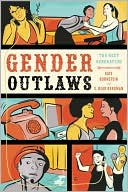 Gender Outlaws: The Next Generation
Gender Outlaws: The Next Generation
Edited by Kate Bornstein and S. Bear Bergman
Seal Press. 304 pages, $16.95
THIS BOOK is a kind of sequel to Kate Bornstein’s Gender Outlaw: On Men, Women and the Rest of Us, published in 1994. Gender Outlaw, which has become a staple in Queer Studies classrooms, questions the fundamental necessity of dividing the human race into only two genders assumed to be “natural” and mutually exclusive. Gender oppression, in Bornstein’s view, is not only a form of inequality imposed on the value-neutral categories of “male” and “female,” but is intrinsic to them. As a charismatic speaker and performance artist, Kate Bornstein exemplifies her own argument. She has done a lot to spread the message that every person in every human culture performs a gender role.
S. Bear Bergman, the other editor of this anthology, complements Bornstein’s voice. While the latter was born in the late 1940’s, Bergman belongs to Generation X and identifies as a transman. Bergman’s book on gender, Butch Is a Noun (2006), defines a self-respecting masculine identity as chivalrous and fun rather than exploitative. Bergman and Bornstein both dramatizes their own concepts as performance artists.
Gender Outlaws resembles a fringe festival, or a series of one-person plays organized into five sections. Most of the pieces are first-person essays on some aspect of transgenderism or gender fluidity. In lieu of a conventional introduction, there’s a flirtatious dialogue between the two editors. Bornstein compliments Bergman’s “genderation” for its sophistication: “People today are starting from further than I got to when I’d finished writing Gender Outlaw. That’s exactly what I hoped to live to see.”
Although most of these pieces describe the disadvantages of being outside the gender binary, the opening article describes the corporate advantages of being fluent in two communication styles. In “Trans-Corporation: A benefit analysis of a transgender man in a corporate setting,” CT Whitley writes: “Thanks to my time in the queer spaces and liberal enclaves I’ve been a part of, I was able to view with fresh eyes the heteronormative world I worked in and its heavily gendered corporate interactions. In a corporate world where the infinite possibilities of sex, gender and sexuality went unnamed and unnoticed, gendered stereotypes about communication quickly proved useful.” Whitley, who identifies as a female-born masculine-identified person, makes a good case for transgendered employees as mediators in a corporate setting.
Much of the anthology, however, has a more comical or experimental feel. Several comic strips and poems appear, along with the transcript of a performance piece, Trans as Fuck, by A. P. Andre and Luis Gutierrez-Mock (photographs included). “I am Transreal: a reflection on/of Becoming Dragon” is a parallel piece on a “mixed-reality performance” by Micha Cárdenas.
The difficulty of finding an appropriate restroom when you’re transgendered is hilariously illustrated in a love letter by StormMiguel Florez, “Dear Austin Special Needs Bathroom.” In another comic monologue, “the secret life of my wiener,” cory schmanke parrish asks rhetorically: “What does my wiener do on the days i don’t wear it?”
There is understated tragedy in this book as well. In “A Slacker and Delinquent in Basketball Shoes,” Raquel (Lucas) Platero Méndez addresses a letter to Maria Helena N.G., a 21-year-old who was imprisoned as a “slacker and delinquent” in Spain in 1968 for going to a bar dressed as a man. In “Marsha P. Johnson: Ten Suns the Transformer,” Tamiko Beyer commemorates a transwoman who took part in the Stonewall Rebellion of 1969 and whose body was found later in the Hudson River. In “Shot, Stabbed, Choked, Strangled, Broken: A ritual for November 20th,” Roz Kaveney explains the need for a Transgender Day of Remembrance: “The ones who died/ The ones we know about/ Thirty a year—that’s more than two a month.”
Time will tell whether this book becomes as influential as Bornstein’s earlier work. In the meanwhile, it is guaranteed to entertain while it deconstructs deeply-held assumptions, including those held by some who describe themselves as transgendered.
________________________________________________________
Jean Roberta is writer based in Regina, Saskatchewan.





